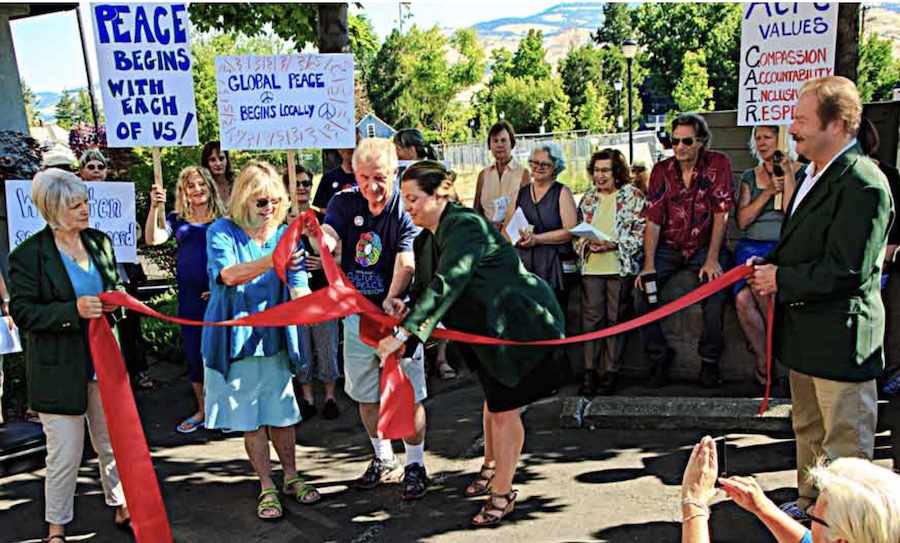. . DEMOCRATIC PARTICIPATION . .
An article by David Wick in Ashland News
Tuesday, May 16, is the sixth anniversary of Ashland officially becoming a City of Peace and joining the International Cities of Peace Association. On May 16, 2017, Mayor John Stromberg, with a unanimous vote of the Ashland City Council , proclaimed that “…the City of Ashland, Oregon is a City of Peace in perpetuity and encourage city and community leaders to develop policies and procedures that promote a culture of peace in our region.”

City officials and Ashland Culture of Peace Commission Executive Director David Wick, center, tie the ribbon at the International City of Peace Ribbon Tying Ceremony in 2017, as a symbol of joining together. Graham Lewis photo
The focus and engagement on this accomplishment has lessened over the last three years due to the impact of COVID, but the legacy of Ashland, the 163rd International City of Peace, has never lessened internationally nor in the hearts of many community members.
Among the current 380 International Cities of Peace in Peace in 70 countries on all six inhabited continents, Ashland has always been held in high regard as an example to learn from. With the guidance of the Ashland Culture of Peace Commission (ACPC), working closely with the City of Ashland, many segments of our community, and other peacebuilding organizations, we are seen as an ideal way of co-creating an infrastructure of peace.
International Cities of Peace (ICP) is an association of citizens, governments and organizations who have by proclamation, resolution, or by citizen advocacy established their communities as official Cities of Peace. The fundamental focus of a City of Peace is on safety, prosperity and quality of life.
There is no 100% peaceful city — rather, all are on the path to “becoming” a more peaceful city. Various forms of violence or hostility affect every community, yet as Mahatma Gandhi reminded, “…acts of love and service are much more common in this world than conflicts and quarrels.” Hundreds of cities around the world are building on their legacy of peacebuilding in a forward commitment to work toward a community-wide culture of peace. Establishing a community as a peace city recognizes past achievements, encourages current initiatives, and inspires future generations for practical peace building.
(article continued in right column)
How can culture of peace be developed at the municipal level?
(article continued from left column)
The Ashland community and city have taken many steps to manifest a City of Peace, many more than can be listed here. This list includes: Options for Helping Residents of Ashland (OHRA) and others assisting people in need, establishment of the Ashland Culture of Peace Commission, Chamber of Commerce action to support businesses, wildfire protection action by Rep. Pam Marsh, Travel Ashland (VCB) Advisory Committee initiatives, installation of the World Peace Flame with middle school Flame Keepers, initiation of the Police2Peace program, Ashland Food Bank, Peace House initiatives and Uncle Foods Diner, Peace Village Festival, the Peace Wall and climate action by The Geos Institute, among many others.
Being a City of Peace is a continual state of making daily choices individually, organizationally, systemically, every one of us. On May 16, 2023, what does this look like in Ashland now and moving forward? How do we want to increase the safety, prosperity and quality of life for all in Ashland, in our region? This can begin with a smile for the next person each of us sees.
Ashland.News Editor Bert Etling and Ashland Police Department Chief Tighe O’Meara both served as Ashland Culture of Peace Commission (ACPC) Commissioners and were recently asked what they value about taking steps to co-create Ashland as a City of Peace.
Bert Etling responded: “I value ACPC’s raising awareness of values that too-often go unspoken and unrecognized, which makes them more likely to fall into disuse. The very existence of ACPC prompts people to think about qualities worth affirming and practicing. On a more concrete level, organization of and participation in events offering the opportunity for people of diverse backgrounds to share their perspectives and harmonious space builds peace in the community. And, of course, the Peace Flame as an ongoing reminder of that energy (in the wonderful Thalden Pavilion space), and sustaining learning about, sharing and passing along those values through the students tending to the site.”
Chief O’Meara’s reply is: “One of the things I value most about the ACPC is that through it we promote conversations, connections, and better mutual understanding. We may not always be able to agree, but unless we come together, we certainly won’t. In those connections and conversations, we have our best chance at understanding, and through that peace.”
As a city and community, we have gone through some rough patches and there are more to come in the challenging times we live in. And the choices and directions are in our hands both individually and collectively. Let’s co-create the very best ongoing City of Peace that we can, together.
An International City of Peace information center is being created at Catalyst Ashland, 357 E Main St., Ashland, 541-625-6565 by owners Precious Yamaguchi and Andres Rivero, and myself, David Wick of the Ashland Culture of Peace Commission.
David Wick is executive director of the Ashland Culture of Peace Commission (Ashlandcpc.org) and president of the Rotary EClub of World Peace. Email him at info@ashlandcpc.org.